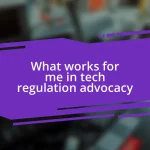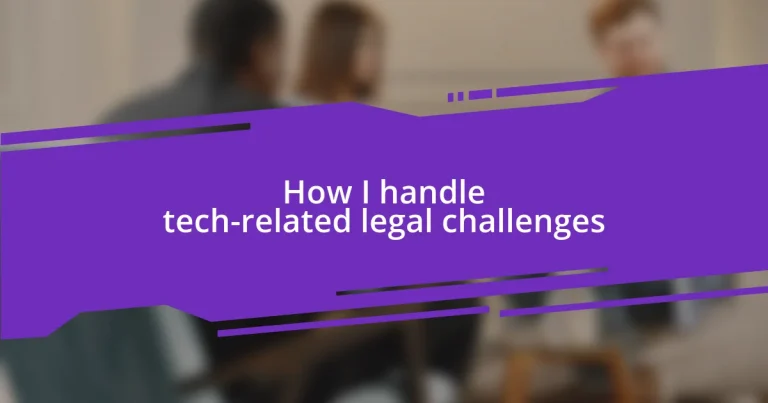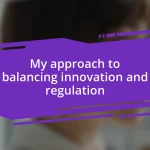Key takeaways:
- Proactive strategies, such as checklists and collaboration with legal experts, significantly reduce legal challenges and foster a culture of compliance within tech teams.
- Understanding and addressing data privacy and regulatory compliance is crucial, as neglect can lead to legal issues and loss of user trust.
- Regularly reviewing and updating policies, along with transparent communication, enhances organizational resilience and empowers team members to contribute effectively.
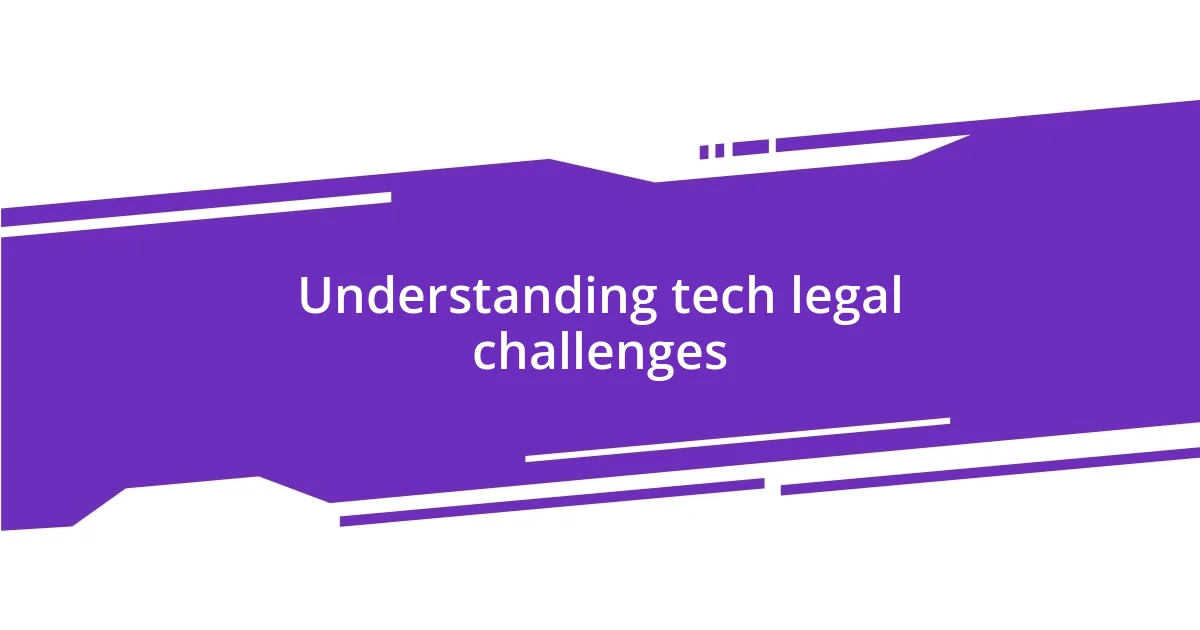
Understanding tech legal challenges
When it comes to tech legal challenges, it often feels like navigating a minefield. I remember one instance where a simple update to an app led to unexpected compliance issues with data protection laws. It’s eye-opening to realize how swiftly regulations can change and impact your work, often without warning.
The complexity of intellectual property rights in technology is another tricky area. I once found myself in a situation where a colleague inadvertently used copyrighted material in a project, thinking it was common knowledge. That misstep not only jeopardized our work but also highlighted the importance of being diligent about understanding ownership and usage rights. Have you ever considered how easily your creative outputs can become entangled in legal disputes?
Regulatory frameworks are constantly evolving, especially with rapid advancements in technology. I’ve often found myself pondering, “Are we always one step behind?” This question has motivated me to stay informed and proactive, ensuring that I anticipate rather than react to potential legal challenges ahead. Embracing continuous learning in this space isn’t just advisable—it can be a game-changer.
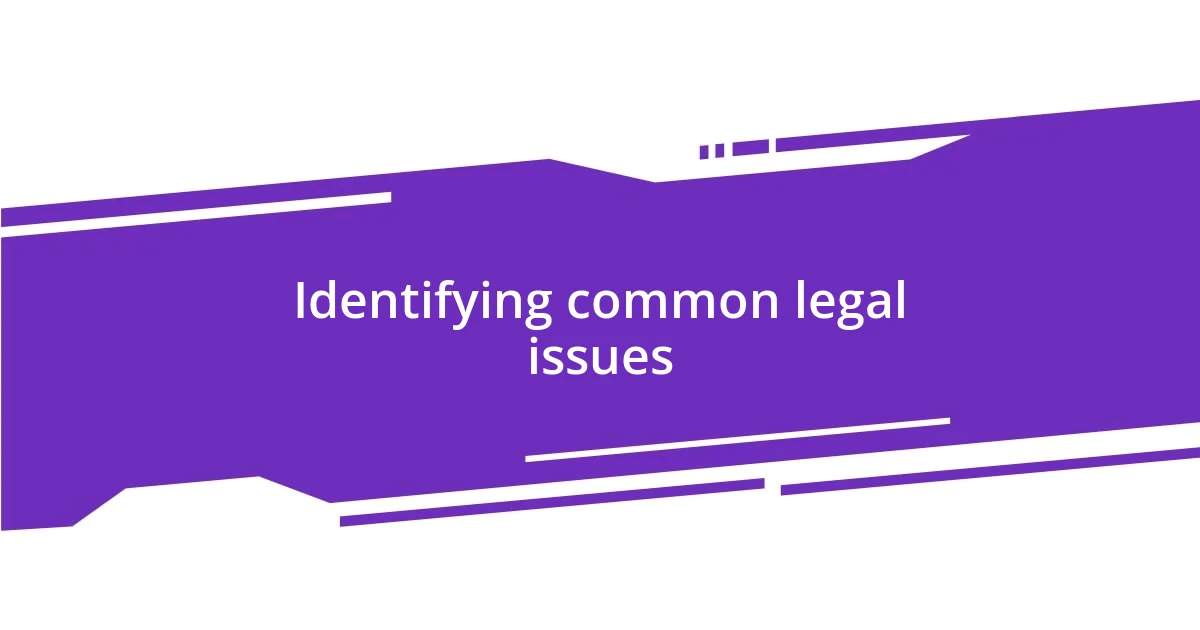
Identifying common legal issues
One of the most prevalent legal issues I encounter in the tech space is data privacy. In my early career, I overlooked the implications of user consent when launching an online platform. The mounting pressure from users demanding transparency made me realize that understanding privacy regulations is imperative. Legally, failing to protect user data not only leads to lawsuits but also damages trust—something that’s hard to rebuild.
Here are some common legal issues in technology that I often see:
- Data breaches: Neglecting security can lead to unauthorized access and severe penalties.
- Intellectual property disputes: Misunderstanding ownership rights can result in costly litigation.
- Non-compliance with regulations: Ignoring industry-specific compliance can lead to fines and business interruptions.
- Software licensing issues: Using unlicensed or improperly configured software can have significant implications.
- User agreement ambiguities: Vague terms of service can lead to user lawsuits and reputational damage.
Each of these challenges is a reminder of the critical importance of diligence in the tech field. I’ve learned that staying ahead requires a combination of knowledge and a proactive approach to mitigate risks.
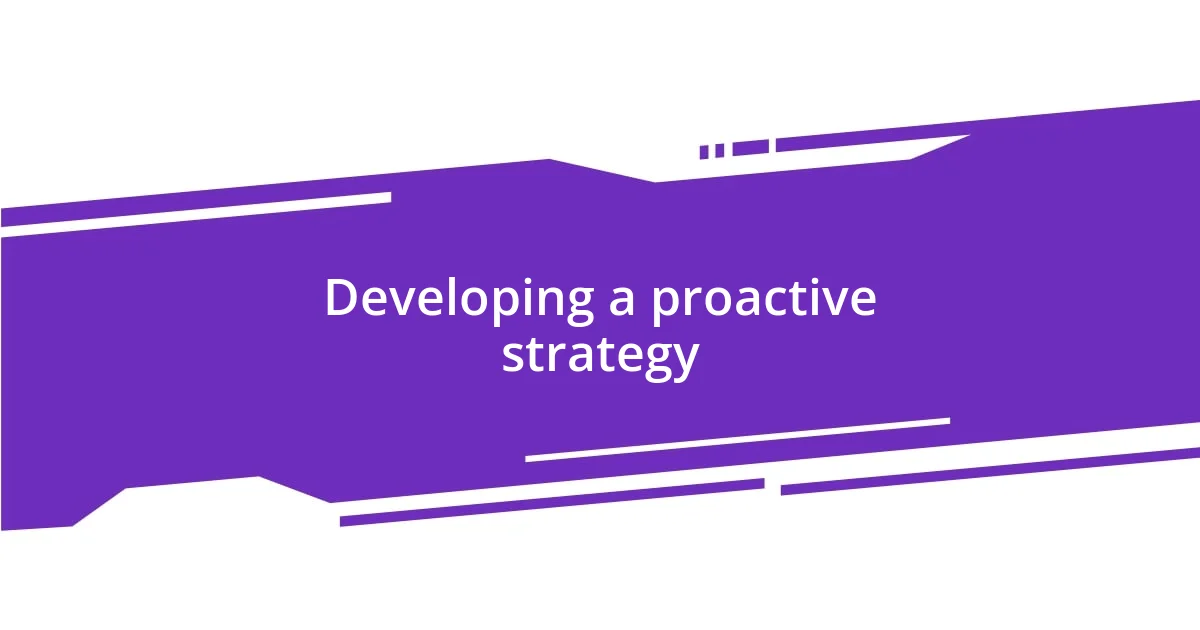
Developing a proactive strategy
When developing a proactive strategy for tech-related legal challenges, I’ve realized that prevention is far more effective than reaction. During a project, I took the initiative to create a checklist that all team members had to follow before any software launch. This simple step significantly reduced the number of issues that arose after launch, allowing us to focus on innovation rather than firefighting. Isn’t it fascinating how small changes can lead to bigger benefits?
Moreover, I tend to forge strong connections with legal professionals and compliance experts early in a project. In one instance, by working closely with an attorney during the initial stages of app development, we uncovered potential pitfalls related to user agreements long before they became a concern. This collaborative approach not only saved us from potential legal headaches but also fostered a culture of compliance within our team, making us all more aware of our responsibilities. Doesn’t it feel empowering to take charge of your legal landscape in this way?
Finally, I make it a point to regularly conduct training sessions related to legal awareness for my team. I usually share stories from my experiences, highlighting past mistakes and victories. For example, after our team faced scrutiny over data security, I organized a hands-on workshop about best practices in data handling. This not only educated the team but also reinforced the importance of accountability. The transformation after these sessions is remarkable—my colleagues not only become informed but also more enthusiastic about safeguarding our projects. Wouldn’t you agree that building collective awareness can lead to a more resilient operation?
| Proactive Strategy | Benefits |
|---|---|
| Checklist Implementation | Reduces post-launch issues |
| Collaboration with Legal Experts | Identifies potential pitfalls early |
| Regular Training Sessions | Increases awareness and accountability |

Seeking expert legal advice
While navigating tech-related legal challenges, I can’t emphasize enough the value of seeking expert legal advice. Early in my career, I hesitated to consult a lawyer about a software licensing agreement. This decision led to confusion and ultimately, an expensive misstep. In hindsight, I learned that having an expert’s input can save not only resources but also peace of mind.
When I finally did reach out for legal advice on a subsequent project, it was like a light bulb moment. The attorney I consulted provided insights that I had never considered, particularly about international compliance issues. It was an eye-opener! I remember feeling a mix of relief and empowerment. Isn’t it reassuring to know that there’s someone who understands the intricate legal tapestry of technology?
Today, I always prioritize bringing legal expertise into discussions from the get-go. I’ve built a habit of inviting legal advisors to brainstorming sessions. This practice has transformed our approach to projects—it encourages a culture where legal considerations aren’t just an afterthought but a vital part of our development process. Doesn’t it make you feel more confident knowing that expert advice is guiding your decisions?
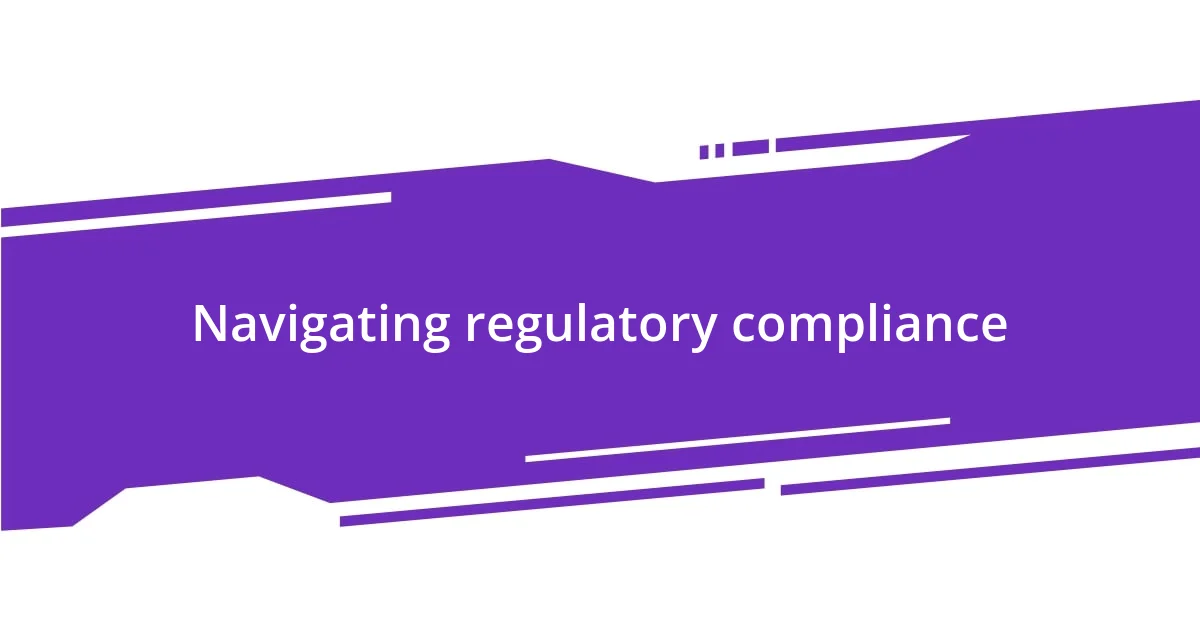
Navigating regulatory compliance
Navigating regulatory compliance can often feel like walking through a maze. I remember when my team was working on a new fintech product, and the regulatory landscape was especially daunting. We were overwhelmed by the various requirements, but then I discovered that breaking it down into digestible pieces made it manageable. By creating a timeline of compliance milestones and regulatory deadlines, we were able to stay on track and avoid unnecessary stress. Isn’t it amazing how organization can transform chaos into clarity?
I also found that involving cross-functional teams made a significant difference in our compliance efforts. For example, during a project related to data privacy laws, I organized a joint meeting with our tech, legal, and marketing teams. This collaboration sparked rich discussions and allowed us to identify compliance risks early on. Seeing everyone rally together to tackle these challenges was inspiring. It made me realize that regulatory compliance isn’t just a legal issue—it’s a shared responsibility that fosters teamwork. Have you ever experienced that transformative moment of collective problem-solving?
Lastly, I’ve learned the importance of staying updated on regulations. It can be tempting to put compliance on the back burner, but I dedicated time each quarter to read up on industry changes. For instance, when GDPR regulations were introduced, I took it upon myself to lead a workshop focusing on how those changes impacted our operations. The response from my colleagues was overwhelmingly positive; they appreciated not only the knowledge but the fact that someone was taking the initiative to keep everyone informed. Doesn’t it feel great to empower others with knowledge and take the stress out of compliance?
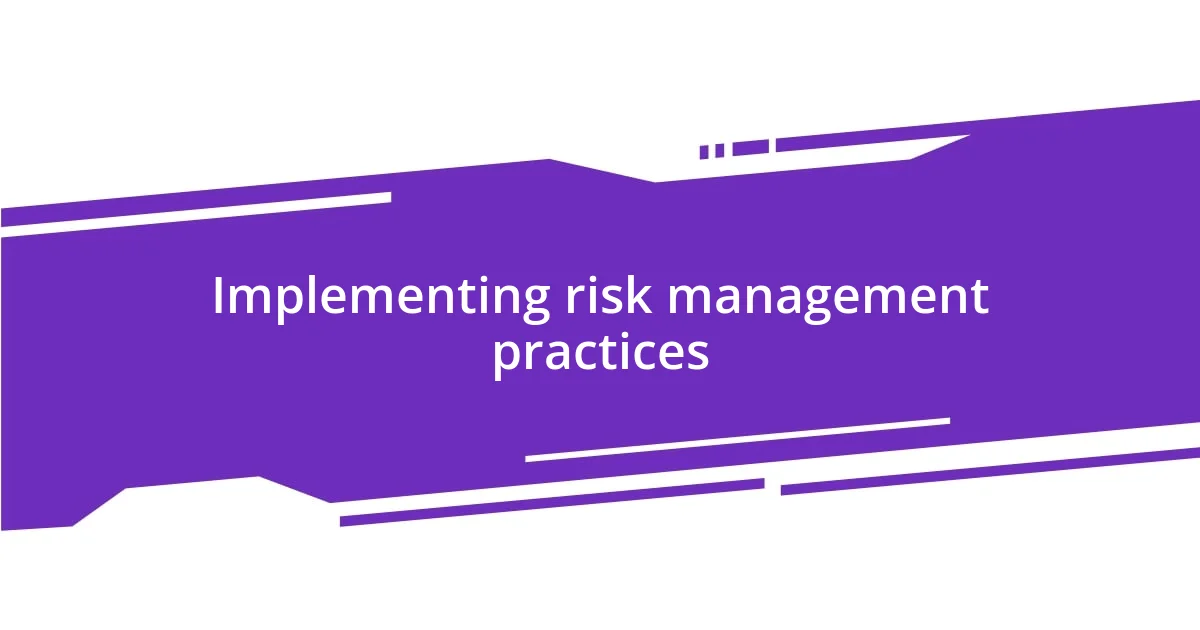
Implementing risk management practices
Implementing effective risk management practices in the tech space is something I truly believe in. I once faced a critical situation when our software update inadvertently introduced security vulnerabilities. The moment I realized we were jeopardizing our users’ data, it sent a wave of panic through me. To avoid this in the future, I established a protocol for comprehensive risk assessments, ensuring our development team reviews potential pitfalls before any launch. Have you ever had that sinking feeling when something goes wrong, only to learn valuable lessons from the experience?
Another aspect of risk management that I’ve found essential is fostering an open communication culture. In one memorable project, we encouraged team members to flag their concerns without hesitation. This cultivated a sense of trust and transparency. It often led to discussing minor issues that could escalate into significant risks down the road. That exchange felt empowering—realizing that by voicing concerns and brainstorming solutions together, we were preventing larger problems. Isn’t it reassuring to know you’re not alone in navigating these challenges?
Lastly, I can’t stress enough the importance of continuous training on risk management strategies. After a particularly challenging quarter, I organized a training session on emerging tech risks, involving experts from different backgrounds. The enthusiasm was palpable! What struck me was how energized the team became when equipped with the right tools and knowledge. It was a reminder that investing in education is a proactive way to handle uncertainties in our field. Doesn’t it inspire you to think that by preparing ourselves, we’re not just reacting but truly taking charge?
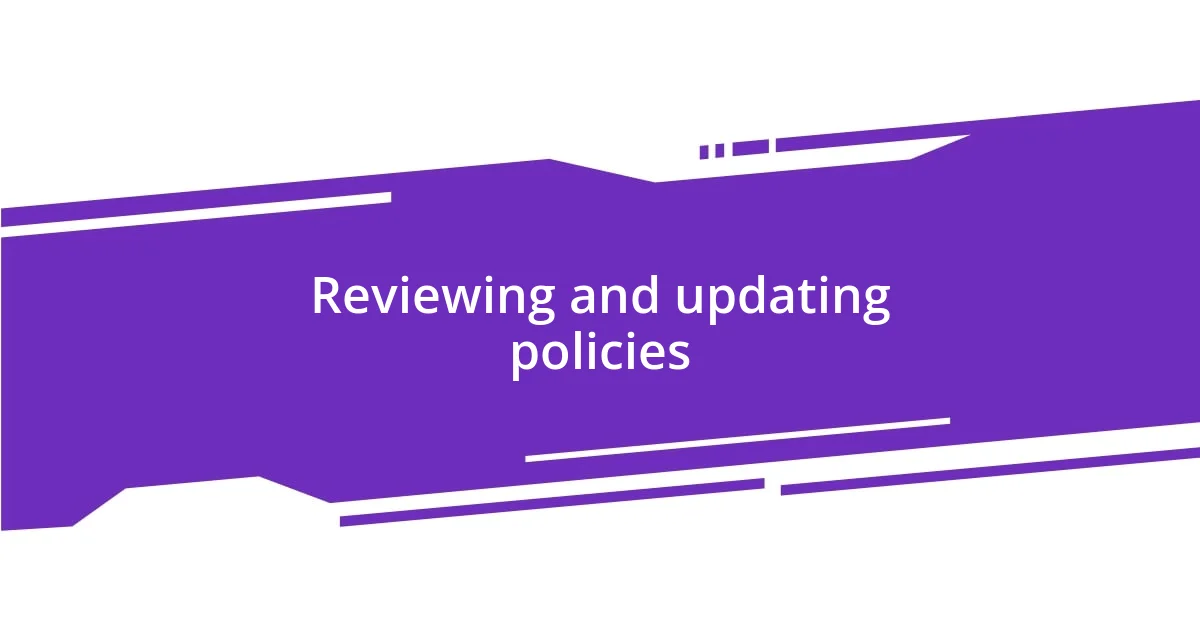
Reviewing and updating policies
Reviewing and updating policies is an ongoing journey I embrace wholeheartedly. I vividly recall the time I discovered a gap in our data retention policy during a quarterly review. It was one of those nail-biting moments when I realized our practices didn’t align with the latest regulations. By collaborating with the legal team, we not only revamped the policy but also introduced quarterly reviews to ensure it remains relevant. Doesn’t it feel reassuring to know that staying proactive can save us from potential pitfalls?
In my experience, integrating feedback from various teams has been invaluable during policy updates. For instance, after circulating a draft of our new remote work policy, I was amazed at how much insight my colleagues provided—everything from clarity on time zones to mental health support. Those candid conversations enriched the document and made it more comprehensive. Have you ever been surprised by the wealth of knowledge within your team? It truly shows that policy development is more effective when it’s a collective effort.
I’ve also learned that transparency plays a crucial role in the review process. When we successfully implemented our updated cybersecurity policy, I held an open forum to discuss its implications. I wanted everyone to feel empowered and informed about the changes. It was rewarding to see team members engage, ask questions, and express their thoughts. Isn’t it motivating to witness that level of participation? It reinforced my belief that when we proactively update policies, we cultivate a culture of trust and ownership within the organization.
